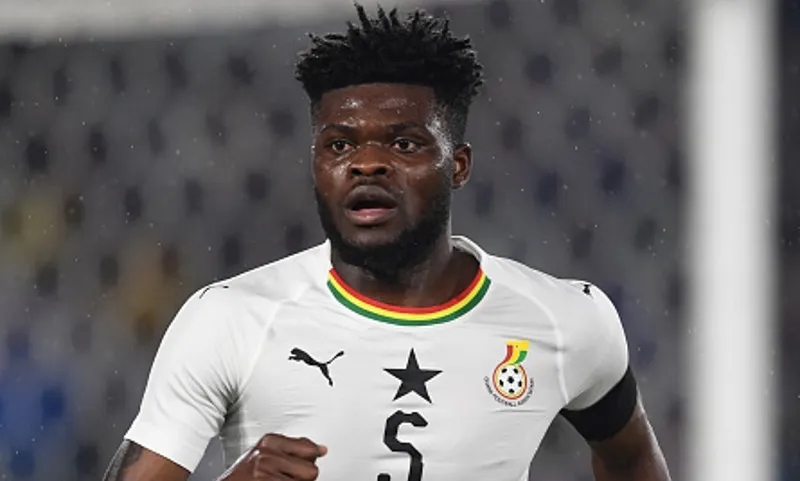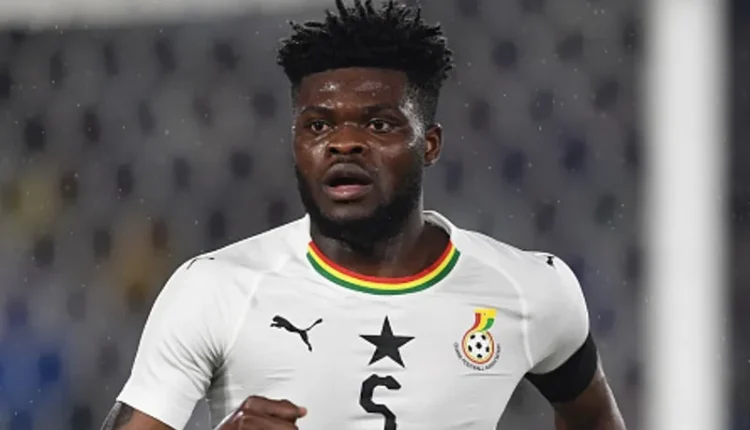
Former Arsenal midfielder Thomas Partey faces multiple rape and sexual assault charges in the United Kingdom—allegations that not only jeopardise his professional career but also threaten the Ghana national team’s prospects ahead of the Africa Cup of Nations and 2026 World Cup qualifiers.
Partey, a key figure for both club and country, now finds his future uncertain, with serious concerns emerging for the Ghana Football Association (GFA) and football’s global governing bodies.
Who Is Thomas Partey?
Thomas Partey is one of Ghana’s most recognisable footballers, having earned 53 international caps and scored 15 goals for the Black Stars. A midfield powerhouse, Partey featured at the 2022 FIFA World Cup and has spent over a decade in top-flight European football.
He enjoyed a successful seven-year spell at Atlético Madrid, winning La Liga and the UEFA Europa League, before transferring to Arsenal in 2020 for £45 million (GH₵700 million). At Arsenal, he made 167 appearances, including 130 in the Premier League, scoring nine goals. However, his contract expired at the end of the 2024/25 season and was not renewed.
What Are the Charges?
Partey has been charged with five counts of rape and one count of sexual assault, relating to allegations from three women involving incidents between 2021 and 2022.
The Metropolitan Police laid out the charges as follows:
-
Two counts of rape involving one complainant
-
Three counts of rape involving a second complainant
-
One count of sexual assault involving a third woman
The 32-year-old was first arrested in July 2022 and had been under investigation since February of that year. On Friday, the UK’s Crown Prosecution Service (CPS) authorised formal charges after reviewing a detailed file of evidence.
“The Crown Prosecution Service has today authorised the prosecution of Thomas Partey for multiple counts of rape after carefully reviewing a comprehensive file of evidence,”
said Jaswant Narwal, Chief Crown Prosecutor for CPS London North.
Partey’s solicitor, Jenny Wiltshire of Hickman & Rose, responded with a statement:
“Thomas Partey denies all the charges against him. He has fully cooperated with the police and CPS throughout their three-year investigation. He now welcomes the opportunity to finally clear his name. Given the ongoing legal proceedings, my client is unable to comment further.”
In the UK, rape convictions carry a maximum sentence of life imprisonment, though sentences typically range between 4 and 19 years depending on circumstances.
Why the Delay in Charges?
Prosecuting sexual offences is complex. CPS guidelines require a “realistic prospect of conviction” before charges can be brought. Investigations often take years due to the difficulty of obtaining corroborative evidence and the legal burden of disproving “reasonable belief in consent”.
Partey remained on police bail throughout the investigation, allowing him to continue playing for Arsenal during that period.
Arsenal’s Response
Arsenal have been criticised for continuing to play Partey while he was under investigation. The club cited legal due process and the presumption of innocence in its handling of the situation.
Following the expiry of his contract, Arsenal issued a brief statement:
“The player’s contract ended on 30 June. Due to ongoing legal proceedings, the club is unable to comment on the case.”
Neither the Premier League nor the Football Association has released a statement.
Broader Implications for European Football
The case adds to a growing list of legal controversies involving high-profile footballers. Benjamin Mendy, Cristiano Ronaldo, and Mason Greenwood have all faced similar allegations, each with varying legal outcomes and career impacts.
Such incidents are forcing clubs, governing bodies, and fans to reconsider how misconduct allegations are handled, particularly with regard to foreign players under contract in elite European leagues.
The Impact on Ghana and the GFA
The charges come at a critical juncture for the Ghana Black Stars, who are preparing for the Africa Cup of Nations and World Cup qualifiers. Partey’s absence—whether temporary or permanent—could prove a major setback.
“This is a huge blow,” said one Ghanaian football analyst. “He’s not just a player; he’s a leader and a symbol of experience. The team’s depth will now be truly tested.”
The Ghana Football Association has not yet issued a public statement, but how it responds could affect its credibility, sponsor relations, and team morale. Ghana’s recent GH₵20 million sponsorship agreement with KGL Group underscores the financial stakes involved.
FIFA and Football Governance
FIFA’s revised Code of Ethics, effective since August 2019, mandates a minimum 10-year ban for sexual abuse or exploitation, with lifetime bans possible depending on severity. While no action has yet been taken, FIFA’s stance in this case could set a global precedent.
FIFA President Gianni Infantino has previously stated, “football sanctions alone are insufficient” in cases of serious misconduct.
If found guilty, Partey could face a global suspension, effectively ending his career.
What Happens Next?
Partey is currently a free agent and is due to appear in court on 5 August. His legal team remains confident of his innocence. However, even if acquitted, returning to top-level football could be difficult due to reputational damage, media scrutiny, and club hesitation.
Legal experts caution that exoneration does not always translate into public acceptance:
“Being acquitted is one thing; being welcomed back by fans, sponsors and clubs is another,”
noted one UK-based sports lawyer.
Should Partey return to the Black Stars, the GFA will face renewed questions about player conduct, image, and national representation.
Conclusion
Thomas Partey’s case underscores the growing intersection between sport, law, and ethics. As proceedings unfold, it will not only test his personal resilience but also challenge Ghanaian football, the GFA, and FIFA to respond with transparency, fairness, and sensitivity.
Until the legal process is concluded, Partey, like any accused individual, is presumed innocent under UK law.



Comments are closed.